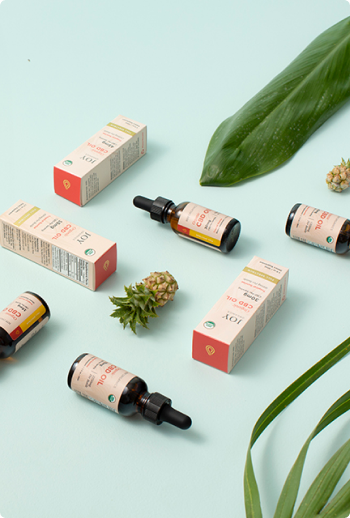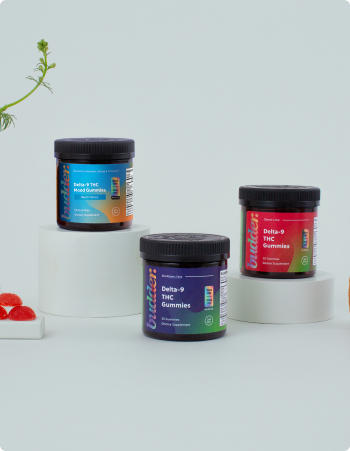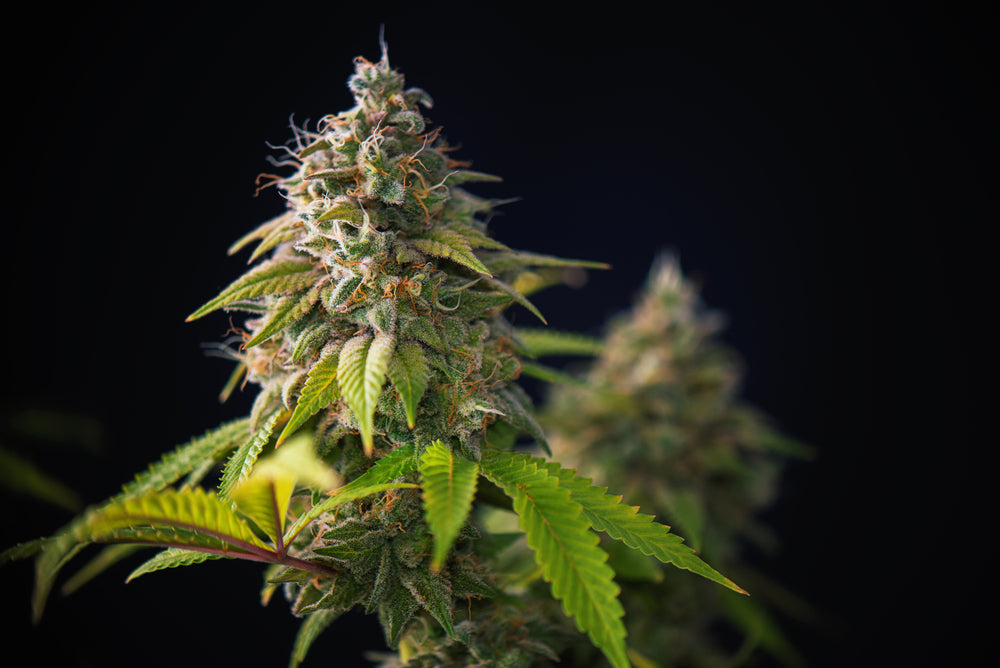Knowing your THC tolerance is essential for choosing the right type of cannabis strain for your needs. Your THC tolerance refers to the body's ability to adapt to the psychoactive effects of tetrahydrocannabinol (THC). THC is the primary cannabinoid responsible for the "high" sensation associated with cannabis consumption. Those with a low THC tolerance may get high quicker than those who have a high one but may also experience negative side effects. On the other hand, frequent marijuana use can increase THC tolerance. So, how long does it take to reset THC tolerance? Let’s take a look!
What Is THC Tolerance?
THC tolerance is what happens when a person becomes less affected by the "high" feeling from THC, the main ingredient in cannabis that causes this sensation. This can occur as someone uses cannabis more often or in larger amounts. Their body gets used to the THC and needs more of it to feel the same effects as before.
When THC enters a person's body, it interacts with an internal communication network called the endocannabinoid system. The endocannabinoid system influences things like mood, appetite, and sleepiness.
The main goal of the endocannabinoid is to maintain balance. To keep everything balanced, the body changes the way it reacts to THC. It accomplishes this task by making fewer receptors available for it to bind to or changing how sensitive these receptors are.
In fact, one study found that those who consumed marijuana frequently had 15% fewer CB1 receptors in their system as compared to those who didn’t use marijuana. When there are fewer CB1 receptors available for THC to bind onto, the person feels less of an effect from the same amount of THC.
Why Does Knowing Your THC Tolerance Matter?
Knowing about THC tolerance is important for people who use cannabis for fun or wellness reasons. For those using cannabis recreationally, being aware of their THC tolerance helps them avoid using too much.
If you overdo your THC limits, you may start to have adverse side effects, such as rapid heartbeats and temporary paranoia. Understanding your THC tolerance ensures that you have a good experience.
For those who use marijuana for wellness, keeping a steady tolerance level is key to managing effects efficiently and avoiding side effects. By understanding THC tolerance, people can make smarter choices about their cannabis use and overall well-being.
What Causes High THC Tolerance?
High THC tolerance occurs as a result of many factors, including genetics, lifestyle, how the cannabis is consumed, and more. Here are some of the most common reasons why a person develops a high THC tolerance.
Genetics
Genetics plays a significant role in how our bodies react to almost anything, including cannabis compounds. Some people are just naturally more sensitive to THC than others. Everything from our body’s metabolism to body composition can influence how much THC it takes for us to experience our desired effects every time we consume marijuana.
Frequency of Use
THC tolerance may increase the more that you consume cannabis. With time, your body will produce fewer CB1 receptors, which decreases the amount of THC that successfully binds to them. As a result, the effects may wear off quicker, which may prompt you to consume more cannabis.
Potency of Products
Partaking in high-THC strains or potent cannabis products can contribute to increased tolerance. The higher the THC content, the more likely it is for the body to adapt and develop tolerance quickly.
Method of Consumption
Certain methods of consuming cannabis, such as smoking or vaping, can cause a faster build-up of tolerance compared to other methods like lab-tested CBD gummies or topicals. Inhaling THC introduces this cannabinoid directly into the body. Therefore, smoking or vaping THC leads to an almost immediate onset of effects.
The effects of THC achieved via these methods also wear off more quickly. A short window of effects could cause a person to over-consume and potentially cause the body to adapt more quickly.
Lifestyle Choices
Our daily routine can also impact our THC intolerance. Factors such as diet, exercise, and sleep can also influence how our body metabolizes THC and the effects of its high. A healthy lifestyle can help maintain the endocannabinoid system's balance, which may slow down the development of tolerance.
How Fast Does THC Tolerance Build?
THC tolerance development varies significantly from person to person, as for all the factors we just discussed. As you can see, there is no one-size-fits-all answer to how quickly a person may become tolerant of THC. However, some general observations can be made based on research and anecdotal evidence.
For occasional or first-time cannabis users, it's possible to notice a slight increase in tolerance even after just a few consecutive days of use. You may notice a reduced intensity of the "high" feeling. In turn, you may require a slightly larger quantity of weed to achieve the same desired effects.
In contrast, regular or heavy cannabis users often experience a more substantial build-up of tolerance over weeks or months. As their body becomes more accustomed to the presence of THC, they may require significantly larger doses or more potent strains to experience the same effects as before.
It's essential to keep in mind that each individual's experience with THC tolerance is unique, and there is no definitive timeline applicable to everyone. Some people may develop a noticeable tolerance within a short period, while others may take much longer.
What Are Signs of a High THC Tolerance?
A high THC tolerance may present itself in various ways. Recognizing these signs can help individuals adjust their cannabis consumption habits for a more enjoyable, safer, and cost-effective experience. Let’s take a closer look at some common signs of high THC tolerance.
Reduced Effects
The most telltale sign of a high THC tolerance is that you notice reduced effects when consuming cannabis. These highs are deemed as “weaker.” For instance, if a strain tends to make you feel energized and focused, with time, you may feel a little less of both.
Used Increased Consumption
Another noticeable indicator that you have an increased THC tolerance is that you need to consume more cannabis to reach your desired effects. For instance, one gummy used to do the trick, but now you find yourself needing a second one in a couple of hours.
To counteract this, some people may opt for more potent products and strains. However, THC tolerance can still build with these alternatives, too.
Does CBD Lower THC Tolerance?
There is currently no definitive evidence to suggest that CBD lowers THC tolerance. CBD and THC are both cannabinoids found in cannabis plants, but they have distinct effects on the body due to their unique interactions with the endocannabinoid system.
THC binds primarily to CB1 receptors in the brain, causing the psychoactive effects associated with cannabis use. Meanwhile, CBD has a low affinity for CB1 receptors and acts more on CB2 receptors. CB2 receptors are mainly found in the digestive and immune systems. CBD is known for its potential wellness benefits, such as supporting mood, muscle comfort, and healthy sleep patterns without causing the "high" sensation associated with THC.
While CBD itself may not lower THC tolerance, it can potentially impact how THC affects the body. In its quest to promote balance, CBD may help with temporary paranoia, cognitive impairment, or munchies associated with too much THC consumption.
This interaction between CBD and THC, known as the "entourage effect," allows users to experience the benefits of both compounds while minimizing the adverse effects.
Incorporating CBD into your cannabis routine may help balance the overall effects of THC, but it is not likely to reduce THC tolerance directly.
How Long Does It Take for THC Tolerance to Lower?
The time it takes for THC tolerance to lower varies greatly among individuals. All of the factors that influence the development of THC tolerance also play a role in lowering it.
The most efficient way to lower THC tolerance is to take a tolerance break, or “t-break.” During this time, the body can readjust the number of available cannabinoid receptors and their sensitivity, allowing for a more pronounced effect when cannabis is consumed again.
It's important to note that the timeline for lowering THC tolerance is highly individualized, and the actual duration needed to reset tolerance may vary from person to person. Monitoring one's own response to cannabis consumption and adjusting the length of the tolerance break accordingly can help ensure an optimal experience when resuming use.
How Long to Take a THC Tolerance Break?
For occasional or light cannabis users, a short break from consumption, sometimes called a "t-break" or tolerance break, may be enough to notice a difference in THC tolerance. A break of just a few days to a week might be sufficient to reset their tolerance to some extent.
On the other hand, regular or heavy cannabis users may require a longer period of abstinence to significantly lower their THC tolerance. In these cases, a tolerance break of two to four weeks, or even up to a few months, may be necessary to reset the body's sensitivity to THC.
It's essential to listen to your body and monitor your response to cannabis consumption. Adjust the length of your tolerance break based on your personal experience and how you feel when you resume using cannabis.
Ways to Lower THC Tolerance
Apart from taking a t-break, there are several other strategies that may help in lowering THC tolerance. Here are some tips for decreasing your THC tolerance.
Smaller Servings at a Time
Instead of consuming large amounts of cannabis in one session, try consuming smaller doses spread throughout the day. Microdosing can help maintain the desired effects while reducing the risk of building up a high tolerance.
Switch Up Your Strains
Rotating between different cannabis strains or products with varying CBD-to-THC ratios can help prevent the development of tolerance. Different strains have unique combinations of cannabinoids and terpenes, which can provide a diverse range of effects on the mind and body.
Change Your Method of Consumption
Experiment with different methods of cannabis consumption, such as edibles, tinctures, topicals, or vaporizers. Each method has a distinct absorption rate and bioavailability, which can influence THC tolerance differently.
Maintain a Healthy Lifestyle
Engaging in regular exercise, eating a balanced diet, and getting enough sleep can help support the endocannabinoid system. Maintaining an active and healthy lifestyle (and endocannabinoid system) could potentially slow down the development of THC tolerance.
Meditation
You can do anything that you set your mind to, including lowering THC tolerance levels naturally. Being mindful of your cannabis consumption and setting clear intentions for its use can help prevent overconsumption and the development of high THC tolerance. Reflect on your reasons for using cannabis and consume it with purpose, whether for relaxation, creativity, or daily comfort.
Understanding Your THC Tolerance
THC tolerance is a complex and highly individualized phenomenon. Factors such as frequent use, high-potency products, method of consumption, genetics, and lifestyle choices contribute to the development of THC tolerance.
To lower THC tolerance, taking a break from cannabis consumption, or a "t-break," is recommended. The length of this break varies depending on the individual's usage habits and personal factors, ranging from a few days for occasional users to several weeks or months for heavy users.
By understanding the causes, signs, and management of THC tolerance, individuals can make informed decisions about their cannabis use to ensure a safe, enjoyable, and responsible experience.




















































Join in on the Conversation
Your email address will not be published. Once your comment is approved, it will be published.